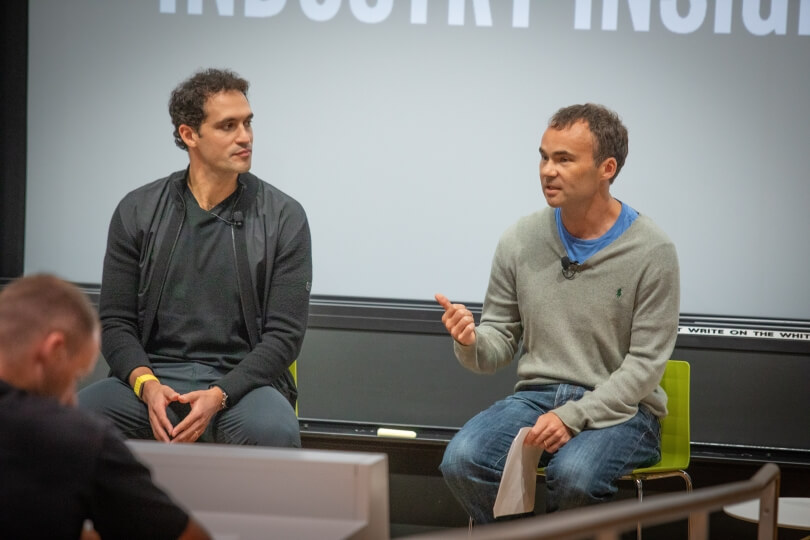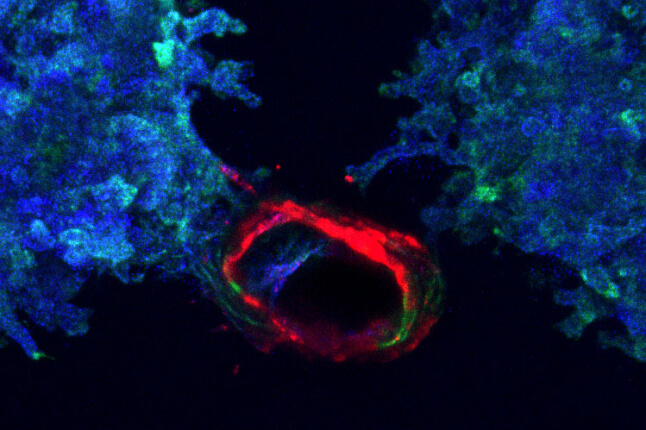News
WHOOP founder Will Ahmed, left, chats with Conor Walsh, Paul A. Maeder Professor of Engineering and Applied Sciences, at Industry Insights lecture series (Eliza Grinnell/SEAS)
Will Ahmed, A.B. '12, asked himself a question while training with his Harvard squash team: how could he avoid becoming rundown during the squash season even as he pushed his body to the limit? He wanted to track the effects of exercise, sleep and diet but consumer technology at the time couldn’t provide that kind of high-quality biometric information.
“I was someone who overtrained as a student, so I’d go through this period of getting fitter and fitter, and then all of a sudden I’d sort of fall off a cliff and not really know why,” said Ahmed, who dual-concentrated in economics and government. “I got very interested in what I thought were fairly simple questions: how could you measure the body, what does it mean to peak on a given day, what does it mean to get fit, and what does it mean to run down?”
Those questions drove Ahmed to found WHOOP at the Harvard Innovation Labs in his final year. His company’s signature product is a membership that combines a 24/7 wearable device with app-based coaching that can help individuals better track how they’re exercising, sleeping and recovering. Based in Boston, WHOOP has grown into one of the most successful wearable tech companies in the world, with a valuation of $3.6 billion. The company’s members include global superstars such as soccer legend Cristiano Ronaldo, NFL Super Bowl Champion Patrick Mahomes, and recent U.S. Open Champion Aryna Sabalenka.
“I really didn't know I wanted to be an entrepreneur,” Ahmed said. “These were things that I was just developing a sense for as a student. My senior fall, I had written a fairly long physiology paper, which outlined how if you can measure X, Y, and Z, you have this deep understanding of the body. I was nervous about this idea of measuring the human body, and so it pushed me to just do a lot of work and research and get to a place where I felt like I had answered all the questions that I was going to answer before taking the full leap of actually doing it."
Ahmed recently spoke with students at the Science and Engineering Complex as part of Industry Insights, an ongoing speaker series for representatives from industry to share advice with students and community members at the Harvard John A. Paulson School of Engineering and Applied Sciences (SEAS). The event was moderated by Conor Walsh, Paul A. Maeder Professor of Engineering and Applied Sciences.
“I'm a premed student and I've only taken computer science at the introductory level, and yet my dream is to build technology,” said Ricardo Marrero-Alattar, A.B. ‘25. “Seeing success stories like Will’s makes me feel that I can be the bridge between technology and medicine.”
Taking risks, finding strong collaborators and developing confidence in your instincts were central themes from the panel. Ahmed recalled partnering with other Harvard students, several of them SEAS concentrators, to develop the initial prototype for WHOOP.
“It does speak to the power of being on a campus like Harvard's and just the people that you can meet,” he said. “At the founding stage, you want to find people with really complementary skill sets and people you like being around, because you're going to spend a lot of time with them. You really have to have a pretty deep mutual respect, and you want to make sure everyone's really all in."
As WHOOP has grown, Ahmed has always tried to balance the company’s current needs with a vision for its future. Even during the prototyping stages, he had to show investors that the hardware could successfully capture heart rate data, while still envisioning a more aesthetically pleasing, consumer-friendly future version.
“There's sort of a trick in fundraising, which is that you want to be projecting the world ahead,” he said. “You don't really want to be talking that much about where you are today. Everything that we could do to paint the picture of where this thing would be was useful from a capital-raising standpoint. I think I was just perpetually fundraising for that whole first 12 months. Another uncomfortable thing about starting a company is you get rejected a lot more than you've ever gotten rejected in your life.”
Persevering through those rejections, Ahmed sought out big-name athletes like superstar Lebron James and acclaimed Olympic swimmer Michael Phelps. By introducing WHOOP to their personal trainers, Ahmed was able to get his product into the hands of people who would not only benefit from it, but would use and promote future iterations.
“If we could get this super elite layer of athletes to wear and authentically get a lot of value out of WHOOP, we could potentially build a whole brand around performance,” he said. “That brand would put us into the consumer market and help us one day to hopefully build a big consumer business. There was a benefit that I didn't fully appreciate at the time, which was starting with a pretty small market, but a market that could potentially fall in love with your product and also put up with some things that early on didn't quite work, because they like the promise of it so much.”
Manufacturing hardware can be far more difficult than software, and many investors told Ahmed to focus on software instead. As more advanced wearables such as the Apple Watch became popular, he also faced pressure to redesign the product from a band to something with a screen or multifunctionality. Ultimately, Ahmed and his team chose to stick with their hardware, finding different ways to innovate such as a modular charger that allows the band to be worn while charging, enabling around-the-clock data collection.
Ahmed encouraged students to develop their own convictions. “Something that is valuable to develop really at any age, but was especially important for me to start developing as someone who wanted to be an entrepreneur, is this notion of finding your own voice and intuition and figuring out what it is that sets you on a path to making a good decision,” he said. “You have all these different voices that are giving you points of view. I think you'll be best off if you can use all of those to inform what's within, which is your own voice.”
Topics: Entrepreneurship, Health / Medicine, Industry
Cutting-edge science delivered direct to your inbox.
Join the Harvard SEAS mailing list.
Press Contact
Matt Goisman | mgoisman@g.harvard.edu



